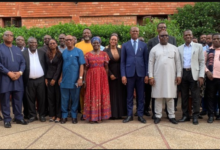Minerals Commission urged to exercise better control on mercury flow

The College of Health Sciences of the University of Ghana has urged the Minerals Commission to curb mercury smuggling by exercising a better oversight on mercury flows.
In addition, it said the Commission should formulate a policy on food contamination by mercury and heavy metals to prevent the harm being done through the use of these chemicals.
In a communiqué issued at the end of the college’s 6th biennial public lecture in Accra, it said “Mercury has many uses including in thermometers, batteries, dental implants, mirrors, fluorescent lighting, and vaccines.
“Of course it is also used in amalgamation stage of (illegal) galamsey mining but because of its ubiquitous availability, Ghanaians are exposed to some amount of mercury at low levels, therefore, much smuggling of mercury into Ghana should cease forthwith,” it said.
The public lecture held on September 27, this year, was on the theme: “Environmental and Health Impact of illegal mining (Galamsey): the real cost of that gold.”
The communiqué said the Minamata Convention, which the government had signed onto, required the country to prioritise the limitation of human exposure to mercury, though its purchase was legal under ministerial control.
It said mercury was considered one of 10 chemicals that had been recognised as a major public health concern as it is estimated that 81tonnes (Tn) of mercury were used annually in Ghana.
It said galamsey had 80 per cent of mercury demand (70Tn used in amalgamation); 32.5Tn released into air, 6.5Tn into water with 6Tn remaining on land.
The communiqué described mercury as poisonous substance which effect may be chronic or irreversible with devastating effects on human systems or some organs in the body.
It said in the digestive system it could cause metallic taste, discoloration of gums while in the nervous system, tremors, confusion, speech, headaches, low cognitive performance, fatigue and poor movement coordination.
In the respiratory system, contact with mercury could cause cough, shortness of breath, pneumonia, pulmonary fibrosis (scar); cause hypertension, palpitations, heart attack in the cardiovascular as well as kidney failure and muscle weakness.
The communiqué also called for the enforcement of the legislative instrument that guides mining activities in Ghana, including the Minerals and Mining Act 2006 (Act 703) to protect the environment and human health.
“Health promotion and sensitisation of miners and members of the mining communities will help to prevent and mitigate the health risks posed by the galamsey mining activities,” it said.
The importance of using dialogue and awareness creation to ensure risk perception at community level were highlighted in the communiqué as well as the need for the civil society and media to play early warning and watch dog role to ensure adherence to existing laws that prevent/mitigate impacts on health and environment.
It also motivated the academia not to limit their understanding of patterns of diseases and injury related to galamsey as long-term effects of exposure to galamsey, including mental health should be highlighted
BY TIMES REPORTER







